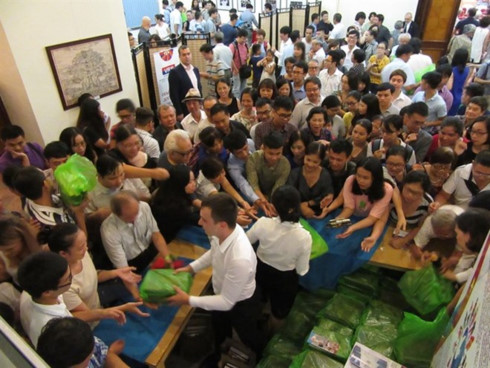
Four new classical and contemporary Russian literary works have been translated into Vietnamese, making them available for local readers.

The publications
include Dau xanh tuoi tre (The raw youth) written by Fyodor Dostoyevsky;
and the comedy in verse Kho vi tri tue (Woe from wit) written
by Alexander Griboyedov, which satirises the society of
post-Napoleonic Moscow.
Additionally, two contemporary short story collections by several Russian
writers were also translated into Vietnamese. They are Kinh nghiem tinh
ai (Love experience) and Doi canh (Wings).
The publication of the books is part of a long-term project, which has been
jointly carried out since 2012, on translating literature from Russian into
Vietnamese and vice versa, under the patronage of Russia’s President Putin,
said Russian Ambassador to Vietnam Konstantin Vasilevich Vnukov at the book
launching ceremony last week.
The project has been carried out by the Russian Centre for Science and Culture
in Hanoi, the Vietnam-Russia Literature Fund and well-known Vietnamese
translators.
Translator Hoang Thuy Toan, director of the Vietnam-Russia Literature Fund
emphasised that Russian literature has had a great influence on shaping the
style of many Vietnamese writers.
"Russian culture has a lasting vitality in the hearts of the Vietnamese people.
I believe that the cooperation in culture and literature will be the basis for
the two countries to build and develop their partnership in many other fields,”
he said.
"Russian playwright and poet Griboyedov’s works have been taught at
universities in Vietnam for a very long time. The lessons have become easier
for our students as they can read some of his works in Vietnamese. Late
Vietnamese movie director Dinh Quang sang the praise of his comedy Woe
from wit many times and wished that one day this comedy would be staged in
Việt Nam. Now, there are many chances for his wish to become a reality,” he
said.
Nguyen Chien, one of the translators of the books, hoped that many other young
translators could help him and other older translators continue the translation
of good Russian work.
"I have been teaching Russian literature for over 30 years at Hanoi University,
and have translated hundreds of Russian works with my colleagues. I believe
that human cooperation is the basis for partners to build strong relations in
many other sectors. Russian literature has had strong influences in shaping the
style of many Vietnamese authors,” he said.-
Source:
VOV
With an increasingly vibrant and widespread emulation movement aimed at building cultured residential areas and cultured families, Yen Thuy District has been making steady progress toward improving both the material and spiritual well-being of its people, while fostering a civilized, prosperous, beautiful, and progressive community.
Once lacking recreational spaces and community facilities, Residential Group 2 in Quynh Lam Ward (Hoa Binh City) has recently received attention for the construction of a new, spacious, and fully equipped cultural house. The project followed the model of state support combined with public contributions in both labor and funding.
The "All people unite to build cultural life" movement, which has been effectively integrated with Kim Boi district’s socio-economic development goals, is fostering a lively spirit of emulation across local residential areas, hamlets, villages, public agencies, and enterprises. In addition, through the initiative, traditional cultural values are being preserved and promoted, while community solidarity and mutual support in poverty reduction and economic development are being strengthened.
A working delegation of the Hoa Binh provincial People’s Committee led by its Permanent Vice Chairman Nguyen Van Toan on June 11 inspected the progress of a project to build the Mo Muong Cultural Heritage Conservation Space linked to tourism services in Hop Phong commune, Cao Phong district.
Born and growing in the heroic land of Muong Dong, Dinh Thi Kieu Dung, a resident in Bo town of Kim Boi district, in her childhood was nurtured by the sweet lullabies of her grandmother and mother. These melodies deeply imprinted on her soul, becoming an inseparable part of her love for her ethnic group's culture. For over 20 years, this love for her hometown has driven Dung to research, collect, and pass down the cultural values of the Muong people to future generations.
In the final days of May, the Ethnic Art Troupe of Hoa Binh Province organized performances to serve the people in remote, mountainous, and particularly disadvantaged areas within the province. These were not just ordinary artistic shows, but they were the meaningful journeys aimed at spreading cultural values, enhancing the spiritual life of the people and contributing to the preservation of ethnic minority cultural identities.


